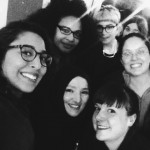YOU. ACCORDING TO SOCIAL MEDIA.
- This girl is on the road again.
- My first pyrography piece. A cake stand!
- Yey! Another first: A sourdough bread, check!
- #end
- Because a friend is on her way…
- Obligatory Selfie! w/ Chris Köver (courtesy), Ruben Karschnik, Fabian Reinbold & Co
- Can’t stand still at work today…
- Thank you, Der Freitag!
- Berlin!
- #SchauHin-Ladies-Selfie in Börlin!
- #HappyBritishMuslims
- Köyceğizin portakalları, portakal ağaçları bir başka…
- Time to say goodbye. #Turkey
- My beloved grandmother is learning how to read and write. At 71.
- Must-have-words in every Turkish household. Check.
Who are you, digitally?
We present ourselves differently on every social media platform – they highlight another feature of our life and character. Each platform has its own rules and norms we adjust and comply to – to their stars, topics and dynamics. It is fascinating how different kinds of people flourish and become influential on each platform. People with seemingly interesting lives will float Facebook, if words are your strength you’d go for Twitter and Instagram is for the visually talented amongst us who look at life not in words but through images.
We all behave (even if only slightly) differently, depending on where we are. However, the spaces on the internet – unlike the different spaces we act in real life – are not autarkic, they interact and can be viewed simultaneously. Are we coherent in who we present to be on the Internet? Do we take this into consideration when (inter)acting?
Sometimes, when we become aware of this, we censor ourselves. We reduce ourselves to our common denominator to hide those opinions and perspectives of our life that would be conflicting with certain circles of friends, groups or audiences – fearing their judgement, disagreement, disapproval and maybe even arguments. But more often than not, we reveal more than we normally would, falsely imagining to be speaking to a private audience. It is like shouting through a bullhorn on stage at a crowded stadium and misbelieving no one would hear us, except for the five people in the front row who are applauding you.
We know more about each other than we want to. This, however, we only realise when we actually meet. Have you ever met in real life a person you were “friends” with online and had to pretend not to know what that person did last week because you weren’t really “friends”? Not to know that he/she had just split up, lost his/her grandmother, went on a vacation in X and finally found a job? If you have experienced a similar situation, you know the awkward feeling I’m talking about. The moment you meet that person, it feels so wrong to know so much.
I felt very alienated from Facebook for a long time, as the amount of information some people were posting was overwhelming and they gradually occupied more and more space on my timeline and consequently in my life and privacy. People who I wouldn’t meet up with in real life. It was, as if Facebook was forcing people into my life. Those on the other hand who mattered to me ended up being quite and sometimes even invisible. As I was yearning their presence in my life, e-mails and phone conversations grew to be more important.
Twitter serves as my daily newspaper, the platform I use most actively. The fact that you are not – at least in theory – limited to friends and acquaintances in your conversations but could address anyone who is on the platform and engage in a discussion, is unique. It is always fascinating to watch how people come together and leave through conversations – those who would’ve never met otherwise (speaking of social bubbles).
Instagram – to me – is a creative space that challenges me to look at life from a visual angle. I love sharing stories, but I usually change names and places to keep people anonymous. How can I continue telling stories? I’m still figuring that out. How can words become images? I think I’ve found my personal answer. The 50 thoughts project has turned into a playful way to combine both visuality, thoughts and texts into one piece: Adding another layer of meaning to your words through the way you choose to place them on a sheet of paper. I thoroughly enjoy experimenting with this.
But the 50 thoughts project has also turned into a wonderful opportunity for me to leave my self-constructed boxes about what I am legitimised to speak and write about and what not. I love the freedom it unintentionally gives: I have a space to fill. Every single week. One thought I can share. This project has allowed me to communicate myself differently and made me more conscious about how I let myself be defined in the digital space.
As I observe my presences and actions on different platforms, as I observe the actions of others, I discover a world in which we tell different stories of who we consider we are, slowly uncovering ourselves, standing in front of each other – naked and vulnerable. Almost as if we were waiting for a little child to wake us up and scream “But they aren’t wearing anything at all!”
But we will not stop any time soon, I guess.















magguieme
offene Fragen… das Kind erkennt und benennt: die sind nackt. ohne bewertung, oder? kann nackt sein auch befreien? wie viel Nacktheit verträgt sich mit dem Klima? wer legt die “Kleiderordnung” fest? wenn alle gleich nackt sind, kann keiner dem anderen mehr etwas vorhalten, oder?
und auch: welches ich ist real? wie viele ich kann ich zeigen? wo bin ich wirklich?
kübra gümüşay
Wichtige & spannende Fragen, tatsächlich. Gemeint war aber mit der Allegorie, dass wir nicht bewusst handeln und entscheiden. Dass wir nicht merken, dass wir nackt sind, obwohl es so offensichtlich ist – also frei nach des Kaisers neue Kleider.
Aber du fragst richtig: Was tun wir, wenn wir es merken? Wie gehen wir damit? Verurteilen wir einander?
magguieme
:) ich weiß. ich habe einen Faden aufgenommen und anstatt weiterzuspinnen, damit kleine Pom-Poms gemacht :)
kübra gümüşay
Oh, sehr schön beschrieben – gefällt mir sehr!
magguieme
noch eine konkrete Frage: gibt es eine Übersetzung zu den Must-have-words? die interessieren mich.
kübra gümüşay
Haha, normalerweise gibt es den Satz als Glitzeraufkleber in so ziemlich jedem muslimisch-türkischen Haushalt: “Was hast du heute für Gott getan?” :)
magguieme
dann glitzert er jetzt bis zu mir :)
bleiben wir also bei den fragen. gut, gut.
danke.
Pingback: Samstagslinks/los enlaces del sábado 17 | Trippmadam